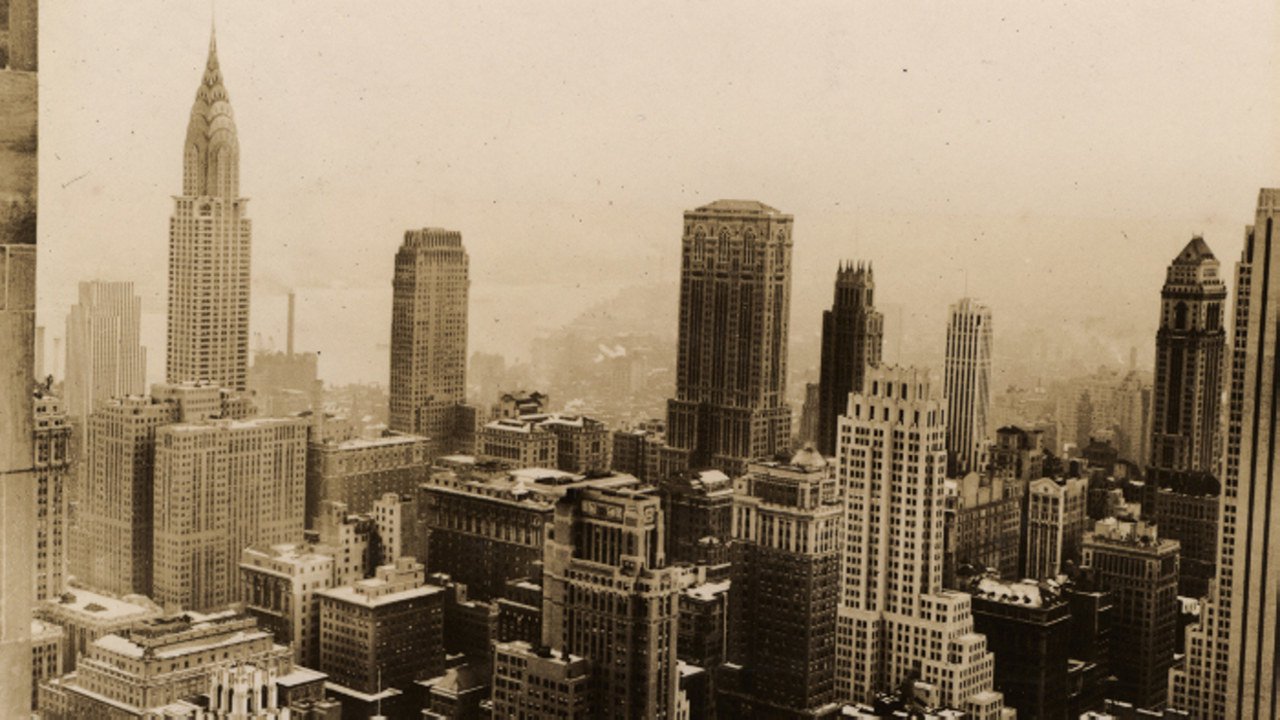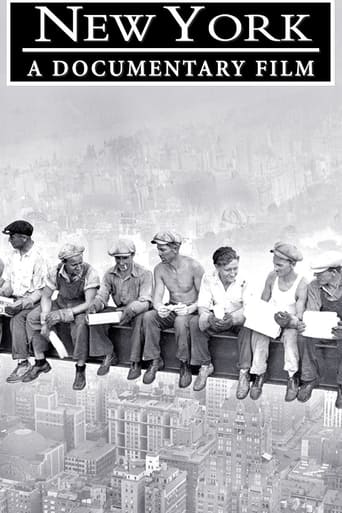

everything you have heard about this movie is true.
... View MoreIt's a mild crowd pleaser for people who are exhausted by blockbusters.
... View MoreI wanted to like it more than I actually did... But much of the humor totally escaped me and I walked out only mildly impressed.
... View MoreI think this is a new genre that they're all sort of working their way through it and haven't got all the kinks worked out yet but it's a genre that works for me.
... View MoreBoth loved and loathed, the former New Amsterdam is arguably the best known city in the United States, the best known city under 500 years old, and love them or despise them, the tourist trap of all tourist traps. But how did that all begin? It's been documented in volumes of books, some now dusty archives in the bowels of the New York public library. It's a city of immigrants, a city of transients, a city of the proud native who wouldn't leave the city, let alone their neighborhood, for anything. This is a tale of how the five Burroughs got together as one mega city, how the names were influenced by its residents. Through readings, poetry of those who loved the city more than any other place on earth, through the memories of those still living remembering important people and events. Racial tensions, depression, war, political corruption, yet home to the greatest arts in America, that to rival the great museums and music halls and theaters of Europe.The seven part documentary focuses on the history, the very important people both good and bad, the architecture, the social impact of every race, religion, culture and creed and how the financial industry was formulated. Vintage footage dating back to the nineteenth century shows the growth of the city. Lovingly narrated by veteran stage, screen and TV actor Davis Ogden Steirs, this never drags. Impacts of the end of slavery resulting in race riots and the Triangle Fire with have you in shock over their impact on every level of humanity.Then there's the political machine, from the days of Alexander Hamilton (yes, the Hamilton of a certain rap musical drama) to Boss Tweed (a character in a forgotten musical called "Up in Central Park") to James J. Walker and Fiorello LaGuardia, subjects of their own Broadway shows. More famous and infamous New Yorkers are legendary today than residents of any other city. Is it any wonder that there are more songs about New York than any other city in the world?While this ends just before the tragedy of September 11, 2001, there's enough history here to keep you glued. In fact, there is enough history in New York City itself to have a weekly documentary for a full year. Memories of historical New York exists everywhere you go, and if this opens you up to taking a walking tour to see those places, don't be surprised to feel the presence of ghostly figures. This is a city that has seen its triumphs and tragedies, its cruelties and kindnesses, and the welcoming of those who sought a new life after hearing about that amazing lady with the torch who still guards our harbor today.
... View MoreAn extraordinary 8 part, almost 18 hour history of New York City; it's politics, economics, architecture, and above all humanity, from the first arrival of white settlers. (I would have been curious to know more about the Native Americans who had been living there, but the focus is on New York as a city, which arguably started with the arrival of the Dutch).I was born and lived the first half of my life in the city, was always passionate about it, and yet the program had so much fascinating information I didn't know – not only about the distant past, but the complex back-room city politics (some disastrously wrong headed, even aggressively racist) that were going on in my early years. It's always lively, often touching and asks important questions about what makes a city and why they're so important -- as well as "how can a city keep 'modernizing', but not lose it's soul?" It also forced me to abandon some supposed "facts" I'd been brought up with as a New Yorker, like the idea that names of immigrants were commonly changed at Ellis Island. The last episode, made after the rest of the documentary, is devoted entirely to the Word Trade Center; it's inception, it's building (and the complex, sometimes dark politics behind it), it's successes and failures as architecture and urban planning, and of course it's horrifying demise. While it's the most emotional of the episodes, it does feel a bit apart from the others, spending it's entire length on one very focused subject. Not a problem, other than a bit of change in style. If one had to nit-pick it would probably be the use of hyperbole in some of the narration. I lost count of how many crises were 'the worst the city ever faced'. But that is a tiny fly in a ton of ointment. The images, still and moving, are beautifully chosen (great seeing moving images from the turn of the century New York), the various expert talking heads are passionate and articulate, and I learned so much more than I expected. It's interesting that film-maker Ric Burns' brother Ken has received so much more attention. I find Ric's many documentaries often the equal of Ken Burns' work, and indeed sometimes find them more emotional.
... View MoreThis is a history of New York, and by extension a history of the U.S. It is a loving history of a great city, beautifully executed. Like a sibling or parent of a flawed man, the historians and other contributors see the flaws but love the subject despite them. A serious history of New York, like of the U.S., reflects the contradictions that go back to the very early days of this city and this country: A melting pot where people of many classes, nationalities, languages and religions learned to live and get along in close proximity – and where many people hated everyone unlike them, or who resented or oppressed everyone whose group arrived in a wave after their own. Where a spirit of democracy, community, equality, public service and a hand up for everyone who needed it resided side-by-side with unbridled greed, indifference to the suffering of others not doing as well as oneself, stupendous corruption, exploitation of slaves and virtual (wage) slaves.Some of the other reviews seem to miss the message by a mile – the historians and other contributors provide useful insights – and accurate ones. I don't know if every numeric and temporal statement is dead-on accurate, but the thrust and the many, many details and nuances discussed throughout the series are correct. From the first line uttered by the narrator in Episode 1: "On September 2, 1609, Henry Hudson " The superlatives, too, are on the mark. Like it or not, New York has not only been a city of all kinds of "firsts" and "biggests" and "bests" but also has a more dynamic and interesting history than most others -- which is why these superlatives are so frequently present. If some day Burns chooses to make a documentary about St. Petersburg or London or Beijing, I'm sure there will be a lot of talk about those cities to the exclusion of all others. In other words, this is a documentary about New York, not a city in Australia, Egypt, France or Russia - where the 19th Century rural peasants DID live much as they had in the Middle Ages.How anyone watching this series and paying attention, could miss the many, many more things Burns covers besides race, class and greed – is surprising. That the series discusses these frequently is not surprising – since long before Hudson sailed up the river later named for him – all 3 have been factors in the history of New York from 1609 to today. To ignore this fact would have been to whitewash the truth. Watch "Rambo" or "X-Men" if you want fiction. Burns and his contributors report these truths – and extol the many virtues – or strengths of New Yorkers famous and anonymous by way of explaining the evolution and rise to the top of the city.Too slow? Really? It covers 400 years , an hour and a half per century for heaven's sake. Personally, I couldn't get enough.
... View MoreI like New York. I think it is a fascinating city, one of the earliest skyscraper cities of the West, one of the most cosmopolitan and dynamic places, and I don't really care about the slow pace of the documentary, but really, to tolerate the sheer number of ludicrous statements in every chapter is too much for me. Whatever the subject, be it the amount of immigrants, the speed of construction, even the metro system, everything is in superlative. Hearing those 'historians' speaking about New York one might think there has never been urban history outside of it. It is always the best, the most, the densest, unheard of, unparalleled and etc. I mean, there are many valid points to make, as New York was a kind of first vertical metropolis of the West but the constant gratuitous exaggeration of everything annoyed the hell out of me. In episode 4 I hear one of the historians saying that those immigrants from Russia where (I am paraphrasing) nothing has changed much from the medieval times suddenly found themselves in the most modern city on Earth. Really? I mean, Russia wasn't the most advanced state in the end of the XIXth century, but it was still one of the biggest empires and Saint-Petersburg was one of the most beautiful cities in Europe. Or when they say that the density of population of East Harlem was the biggest ever seen in the history of humanity. Wow, why not in the history of the universe? Why be so modest? These constant exaggerations really spoils what is otherwise an interesting deep insight into the urban history of the Western immigrant culture.
... View More